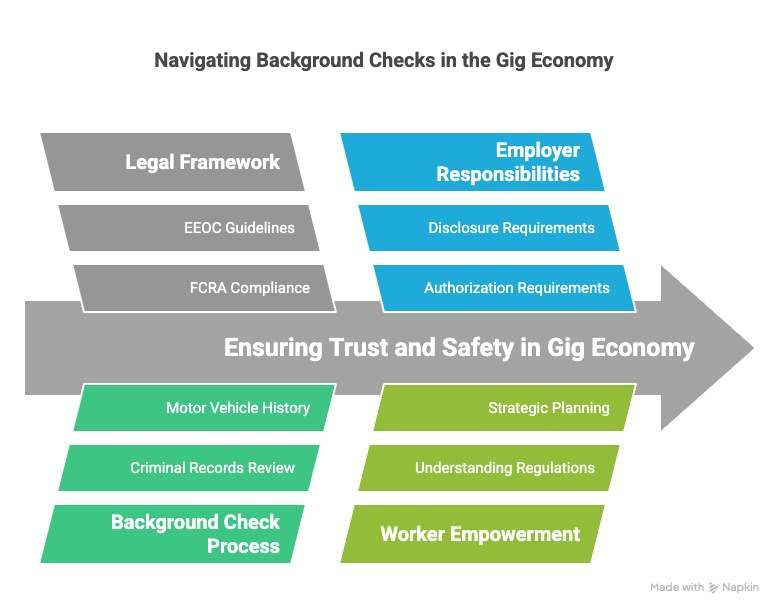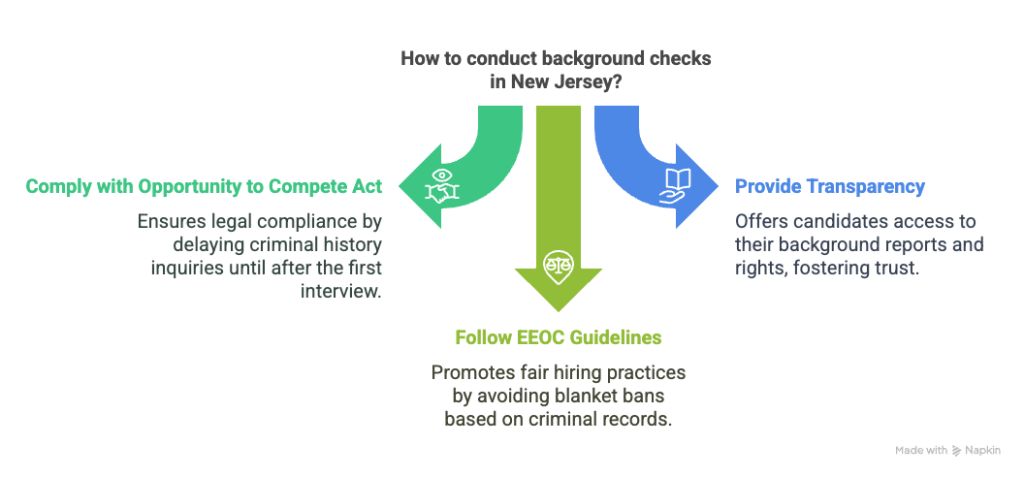The gig economy has redefined traditional employment, offering flexibility and autonomy to countless individuals. In New Jersey, the prominence of platforms like Uber, Lyft, and various food delivery services has soared, creating both opportunities and challenges for workers and employers alike. These changes have made thorough background checks a vital component of the hiring process to ensure safety and reliability for all parties involved.
This article provides an in-depth exploration of New Jersey's gig economy background checks, detailing what aspiring gig workers can expect and what employers need to consider. We'll cover the specifics of rideshare and food delivery screenings in NJ, delve into the legal requirements, and share useful resources for navigating this essential step in the employment process.
Key Takeaways
- The gig economy in New Jersey offers flexible work, but background checks are crucial for safety and trust in rideshare and delivery services.
- Background checks in the gig economy cover identity, criminal records, and driving history, ensuring safety for consumers and workers alike.
- For rideshare services like Uber and Lyft, specific documentation and clean records are necessary, with subtle differences in application processes.
- Food delivery platforms require thorough checks of driving history and criminal records, promoting safety during customer interactions at home.
- Compliance with New Jersey's legal requirements on background checks ensures fair and nondiscriminatory hiring processes for both employers and workers.
Introduction
The gig economy is booming in New Jersey. With platforms like Uber, Lyft, and various food delivery services, many find work that fits around their lives. These services have become part of everyday life, bringing convenience and new job opportunities.
Background checks play a crucial role here. They ensure that everyone involvedâdrivers, riders, and consumersâstays safe. For gig workers, passing a background check can be the deciding factor between getting a job or not. Employers need these checks to maintain trust and reliability in their services.
In this article, you will learn about how background checks work in the NJ gig economy. You'll get a look into the specific processes for rideshare services like Uber and Lyft, as well as food delivery platforms. Youâll also find essential information about legal requirements and practical resources for navigating the screening process.
Understanding Background Checks in the Gig Economy
Background checks are a staple in the hiring process. They verify the identity of a potential worker, ensure public safety, and protect the company's reputation. For gig economy jobs in New Jersey, such as those with Uber, Lyft, or food delivery services, background checks serve a critical purpose. They help evaluate trustworthiness, reliability, and safety â key concerns when consumers and workers intersect in personal spaces.
In New Jersey's bustling gig economy, background checks are particularly crucial. When you step into a rideshare vehicle or receive a food delivery, trust is paramount. You depend on the overall safety and reliability. With a thorough background check process, companies can assure their users and clients that drivers or couriers are fit for the job. This process balances access to employment opportunities while ensuring consumer protection.
The legal framework surrounding background checks in New Jersey is guided by state and federal regulations. These include the Fair Credit Reporting Act (FCRA) and the Equal Employment Opportunity Commission (EEOC) guidelines. Employers must navigate this complex legal environment carefully. For instance, the EEOC advises on how race, national origin, and other factors should not unfairly impact hiring decisions. As you engage with the gig economy, understanding these regulations can empower you as a worker or employer, ensuring a lawful and fair process.

In practice, a typical background check for gig workers might include a review of criminal records, motor vehicle histories, identity verification, and sometimes a credit check. However, employers must remain compliant with both disclosure and authorization requirements. Understanding these elements and how they interplay with the gig economy's demands can arm you with the knowledge needed to navigate these waters effectively.
Have you checked how these regulations affect your operations or job applications? Do you have the right strategies in place?
NJ Rideshare Screening: Uber and Lyft
Rideshare services like Uber and Lyft have specific requirements for drivers. As an applicant, you need to present a valid driver's license, proof of insurance, and vehicle registration. Your driving history must be clean. Any serious violations or recent accidents can be red flags. Both companies conduct background checks to ensure these criteria are met.
The background check process starts with your application. Uber and Lyft both use third-party services like Checkr to run criminal background checks and review driving records. Expect this process to take a few days, but it can extend to a week if additional information is required. You'll receive status updates via your app.
Delays in background checks often come from incomplete applications or outdated information. If you encounter an issue, contact support promptly to resolve it. Discrepancies in the report should be disputed immediately. Understand the documentation you submit must be accurate and up-to-date.
Comparing Uber and Lyft, both have similar screening processes, but there are some differences. Uber might have stricter requirements regarding your driving record or past criminal activity. Lyft, while similar, could vary slightly depending on specific local laws in New Jersey. Knowing these variations can help you tailor your application and improve your chances of approval.
Food Delivery Checks in NJ
Food delivery platforms like DoorDash, Instacart, and Uber Eats have unique requirements for their drivers. To start, you'll need a valid driver's license, vehicle registration, and insurance proof. Expect to provide personal information for identity verification, like your Social Security number. These documents form the basis of your application but are just the starting point.
The screening process for food delivery services typically involves a multi-step background check. After submitting your application, companies run a criminal history check, looking for convictions that might pose a safety risk. They may also review your driving history to ensure you have a clean record. While some discrepancies can delay the process, they can be resolved, often through direct communication with the service's support team.
Unlike rideshare services, background checks for food delivery may not always require as detailed scrutiny of driving records, depending on the platform. However, compliance with local regulations pivots on ensuring that you are fit to operate a vehicle and interact safely with customers. Background checks build trust with consumers and partners, reinforcing operational safety standards.
Consider the safety implications. Food delivery workers often interact with customers directly at their homes. A thorough check helps ensure that you contribute to a safe working environment. Adhering to these screening protocols is not just about compliance; itâs about taking responsibility for your role in the chain of service.
Navigating these checks isn't just a hurdle; it's an integral part of getting started. If you prepare ahead, understand what's required, and double-check your information, your experience will run smoother. Stay informed and engaged with policy updates from your chosen platform to maintain compliance and secure and maintain your position in the gig economy.
Legal Considerations in New Jersey
New Jersey has its own set of laws when it comes to background checks in the gig economy. As an employer, knowing these laws is essential. Failure to comply could lead to legal trouble. For example, New Jersey's Opportunity to Compete Act affects how and when you can inquire about a candidate's criminal history. This "ban the box" law requires that employers wait until after the first interview to ask about criminal records.
As a worker, it's important to understand your rights. You have the right to know what's in your background report, and you can dispute inaccuracies. For employers, transparency is key. Make sure you provide a copy of the report and a summary of rights under the Fair Credit Reporting Act (FCRA).
The EEOC guidelines are also worth noting. While they are federal recommendations, they impact how background checks are conducted in New Jersey by advocating against blanket bans on hires with criminal records. Instead, they promote individualized assessments based on the nature of the crime, the time elapsed, and its relevance to the job.

Keep these points in mind whether you're hiring or applying. They don't just keep you on the right side of the law; they foster a fairer hiring process for everyone involved.
Resources and Tips for Navigating NJ Gig Economy Background Checks
As you navigate the demands of New Jersey's gig economy, it's important to equip yourself with tools and information that make the background check process straightforward. For employers, understanding and implementing comprehensive screening processes are crucial. For workers, the right preparation can minimize delays and ensure smoother onboarding.
Employer and Worker Resources
Start with reliable resources that offer clear guidance on screening steps. Platforms like GCheck's blog provide insights specific to gig economy needs. These resources outline everything from initial application steps to addressing background check disputes. Familiarize yourself with these sites to have a well-rounded understanding of the process.
Common Pitfalls and Solutions
Both employers and workers often encounter pitfalls during the screening process. One common issue is incomplete documentation. Employers should maintain a checklist of necessary documents based on the screening platform used. For job seekers, ensure that your personal information and past employment details are accurate and up-to-date.
If discrepancies arise, prompt action is key. Mistakes in a background check can delay or halt hiring. New Jersey law allows individuals to dispute errors by contacting reporting agenciesâensure you know this process and have the relevant contact details at hand.
Preparing for Your Background Check
Preparation is your best tool when it comes to background checks. Gig workers should gather all necessary documents in advance. This includes identification, driving records for rideshare roles, and any relevant licenses or permits. Understand your rights: you can request a copy of your background check, and you have the right to contest any inaccuracies.
Consider signing up for services that pre-screen your records regularly, helping you stay ahead of any potential issues. Being proactive can make a significant difference in reducing unnecessary stress and ensuring a faster hiring process.
By leveraging these insights and resources, you can approach New Jersey's gig economy background checks with confidence. This preparation not only smoothens the process but also ensures you meet compliance requirements seamlessly.
Conclusion
Thorough background checks maintain safety and integrity in the gig economy. In New Jersey, where platforms like Uber, Lyft, and various food delivery services are flourishing, ensuring consistent and lawful screening processes is critical. By understanding the checks involved, both gig workers and employers can ensure they partake in a transparent and reliable process.
For gig workers, being prepared is key. This means knowing the documents required and understanding your rights around these checks. For employers, it's about implementing processes that align with state and federal regulations, ensuring all background checks are fair, accurate, and nondiscriminatory.
As gig work grows, so does the importance of effective screening. Both workers and companies should stay updated to protect their interests and public trust. The gig economy in New Jersey will likely continue to evolve, and background checks will remain a pillar of this dynamic workforce. Stay informed, and make safety a priority for everyone involved.
Frequently Asked Questions (FAQs)
What disqualifies you from Uber in NJ?
A history of violent crimes, sexual offenses, or certain drug offenses can disqualify you. Multiple moving violations or major incidents like a DUI in recent years could also lead to disqualification.
Does Lyft check criminal history in NJ?
Yes, Lyft runs a criminal background check for safety. This check looks for any history of violent crimes, sexual offenses, and other serious criminal activity.
Can a DUI affect gig work in NJ?
Yes, a DUI can affect your eligibility. Many gig companies, including Uber and Lyft, may disqualify you if the DUI is recent, typically within the past 7 years.
How often do NJ gig companies recheck backgrounds?
Companies like Uber and Lyft typically run annual background checks to ensure continued compliance with their standards.
Are NJ gig workers considered employees?
No, gig workers are generally classified as independent contractors, which affects benefits and protections.
Can you appeal a gig background check denial in NJ?
Yes, you can appeal a background check denial. Contact the company directly to discuss any errors or provide additional context.
Do gig companies check credit history in NJ?
Generally, gig companies do not check your credit history; they focus on criminal and driving records.
How far back do Uber checks go in NJ?
Uber's background checks typically go back 7 years, focusing on criminal history and driving records.
Are misdemeanors a problem for gig work in NJ?
Misdemeanors may pose a problem depending on the offense and how recent it is. Each company has different criteria.
Do delivery drivers need fingerprinting in NJ?
No, fingerprinting is not usually required for delivery drivers in New Jersey.
Do you need a special driver's license to work for rideshare companies in NJ?
No special license is required, but a valid driver's license is necessary.
Can you work for multiple gig companies at the same time in NJ?
Yes, you can work for multiple companies simultaneously, as they classify you as an independent contractor.
Is vehicle insurance necessary for gig work in NJ?
Yes, you must have valid vehicle insurance to work for rideshare or delivery services.
Are there vehicle requirements for rideshare drivers in NJ?
Yes, rideshare companies often have age and condition requirements for vehicles. Check directly with the company for specific details.

GCheck Editorial Team
Meet the GCheck Editorial Team, your trusted source for insightful and up-to-date information in the world of employment background checks. Committed to delivering the latest trends, best practices, and industry insights, our team is dedicated to keeping you informed.
With a passion for ensuring accuracy, compliance, and efficiency in background screening, we are your go-to experts in the field. Stay tuned for our comprehensive articles, guides, and analysis, designed to empower businesses and individuals with the knowledge they need to make informed decisions.
At GCheck, we're here to guide you through the complexities of background checks, every step of the way.






